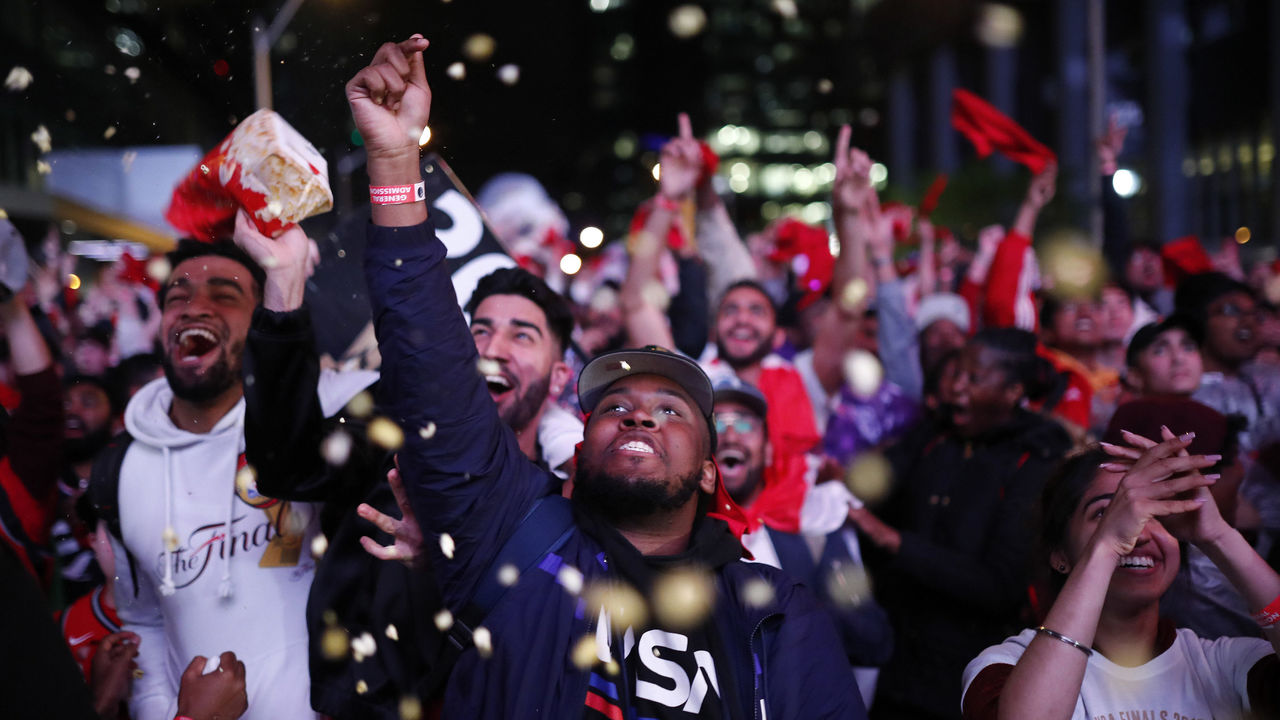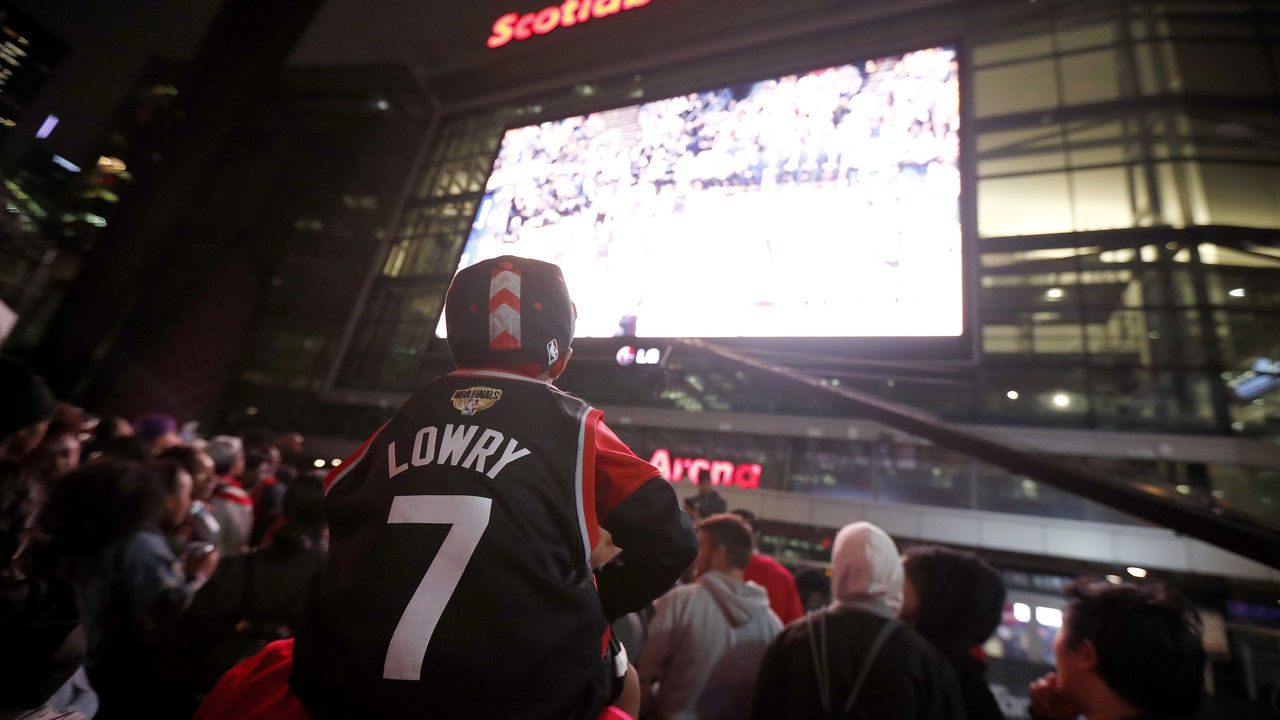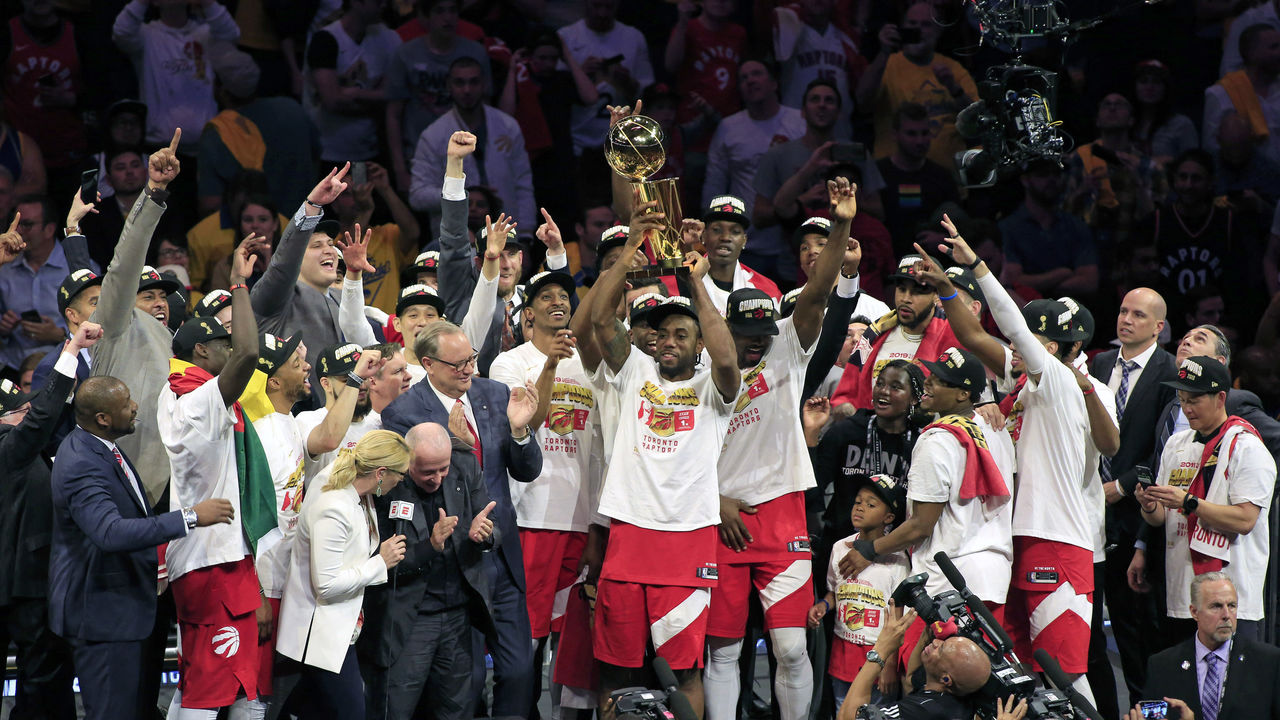For Toronto, and Canada, the Raptors' NBA title is a gift worth celebrating
After the Raptors won Game 4 to go up 3-1 on the Warriors in the Finals, Kawhi Leonard was asked what he thought a championship would mean to Canada.
"I'm really not sure," he said. "I guess you have to ask somebody on the street, or one of our fans ... somebody that's been living in Canada for a while. I don't know, we'll see."
And now we've seen.
I'm somebody who's been living in Canada for a while, and I'm still trying to sift through exactly why this means so much to me, and the people in my life, and the rest of Toronto and the country.
Obviously it feels good to win, or at least be a part of winning in some peripheral way. It's fulfilling to watch a group of people you've grown sentimentally attached to reach the pinnacle of their profession. It might just be that simple. Most of the time, I don't view my Raptors enthusiasm through a patriotic lens - at least not in a way that goes beyond the standard localized tribalism baked into most forms of fandom.
Of course, the Canadianness of the Raptors is impossible to avoid at times. It pervades almost every element of the team's branding. It's been cited by players in the past as a specific reason they haven't wanted to play in Toronto. And there's a contingent of the Raptors' fan base (the Spooky Mulder faction, as ESPN's Zach Lowe likes to call it) that has a serious persecution complex, with complaints that range from a lack of U.S. national media coverage to anti-Canadian refereeing bias.
To me, this postseason run was the first time the Raptors really felt like Canada's Team. Thousands of traveling or expatriate fans stayed behind after Game 4 at Oracle Arena and belted out the national anthem. Jurassic Parks popped up all over the country. Each game seemed to set a new national viewership record. Coast to coast, millions and millions of people were all pulling for the same outcome, all caring about the same silly team.

Canadian identity is often a difficult thing to pin down. For better or worse, I don't think we're as different from Americans as we like to tell ourselves, or as Americans sometimes like to tell us we are. But our neighbours to the South do take up a lot of oxygen in the cultural and sociopolitical discourse, so the little-sibling syndrome persists. The symptoms manifest as both pride and insecurity, two things that are inextricably linked. Nobody can subsist on internal validation alone. Part of the thrill of seeing all those shots of packed Toronto streets and hearing the national U.S. media breathlessly extol the energy and passion in the city was the feeling of being seen.
For a while, that was part of the Raptors' struggle even within their own country's borders. When the NBA arrived in Canada 24 years ago, it had to take root in frozen soil. The Grizzlies, who were inaugurated the same year as the Raptors, lasted only six years in Vancouver. For Toronto, Vince Carter helped. But the city also changed demographically in the intervening years (according to Statistics Canada, the percentage of Toronto's population made up of visible minorities jumped from 31.6 percent in 1996 to 51.5 percent in 2016), ushering in a new generation for whom a global sport may have held more sway than the one woven into the fabric of the local culture.
The significance of the Raptors fan base's diversity maybe isn't for me - a third-generation Canadian white dude - to speak on. I've never felt othered as a basketball fan in this country. Once upon a time, I may have had to sit through 10 minutes of hockey highlights to get to the NBA package on SportsCentre, or had to walk a bit further to find a bar that would show the Raptors on nights there was a Maple Leafs game on, but this isn't some burden I've carried. I'll just say that it matters to me a great deal that people in this country who have been othered, for reasons that go beyond their taste in sports, have found a sense of belonging in a fan community in which they're visibly represented. And it matters that that community is the one being seen, and heard.
I don't think that fundamentally changes what Toronto is, which is a place full of cosmopolitan cultural vibrancy but one still fraught with significant problems like any other big city. But most people are proud of where they come from, even if that pride doesn't preclude an acknowledgement of that place's flaws. A sports championship stokes that civic pride in a way that is almost jarringly tangible. It's the whole city massing in the streets, stranger hugging jubilant stranger, saying, "We did it!"
We. It's easy to step back and recognize the absurdity of crediting ourselves for the achievement, but that's just what we do. We attach feelings of identity and self-worth to our sports teams. They become stand-ins for us, because they can make winning literal in a way we can't. Sure, the Raptors are overwhelmingly made up of non-Canadians, as some have needlessly pointed out. Yes, they did all this for themselves and their families and each other, first and foremost. But whether they intended to or not, they also did it for us. To answer the question Leonard could not: it means everything.

You can say there's an element of make-believe to the whole vicarious enterprise and the spirit of unity and collective pride it engenders, but that doesn't feel important right now. The illusion is justification in itself. This is something we can all claim. It matters because we decided it matters.
As someone who long ago decided the Raptors mattered to me, the most powerful feeling as I watched them close out the depleted Warriors in six games was catharsis. For all the years of futility, mismanagement, and star-player migration that defined their first two decades; for the three seasons they spent playing in the SkyDome, with seats so far away you could barely make out what was happening; for all the playoff letdowns that made even the team's golden era feel like a disappointment; for all the ridicule and cute-story condescension; for Paul Pierce and LeBronto and all the rest. This is a franchise that, as Draymond Green might say, "got it out the mud," and made itself into something.
It wasn't just the what that made the Raptors championship special, but the how and the who. It was the dramatic twists and turns the postseason took. It was the airless Game 4 against Philly, and then the nerve-fraying Game 7 and the shot that won it. It was the gut-punch of Game 1 against Milwaukee, and then the heroic survivorship of Game 3, when they looked in danger of being swept and instead turned a win into a springboard for a back-door sweep the other way. It was the two home games that narrowly escaped their grasp against the Warriors, and the three road wins that made those losses not matter.
I'll remember Pascal Siakam trying to problem-solve his way around the hulking defenders opponents stuck on him, before going nuclear in his first-ever Finals game against the defending champions and their former Defensive Player of the Year.
I'll remember Kyle Lowry shedding his playoff reputation, bouncing back from every substandard performance by playing his most aggressive and purposeful basketball the following game, and thoroughly owning the Game 6 title-clincher.
I'll remember the feeling of calm Leonard instilled, the way he could take over a game at a moment's notice with a personal 10-0 run. I'll remember Fred VanVleet hounding Steph Curry for 80 feet through a byzantine maze of screens, and replacing one of the worst shooting stretches of his career with one of the best midway through the playoffs.
I'll remember Marc Gasol anchoring the defense with his timely back-line rotations and languid brilliance.
I'll remember the steely focus with which they did all of this. I'll remember how frustrating it could be to see how unaffected and dispassionate they were about all the improbable and extraordinary things they were doing; how I'd search for some sign they were feeling what I was feeling; and how the stone-faced facades would finally melt away at their most emphatic moments of triumph.

I could go on. I'll be talking about all of this for a long, long time. It will recede into the past, as everything does. Like every good memory, it will become bittersweet over time. But I'll try to hold onto this feeling. I'll try to remember what it was like.
To a certain extent, I think a lot of us believe - or at least want to believe - that the world is disposed to act in our best interests, even in the face of so much evidence to the contrary. That notion permeates the whole spectator-sport apparatus. There's an underlying sense that rooting for a winner is a right. It's what leads fans to say stuff like, "We deserve this."
But, to borrow a phrase, deserve's got nothing to do with it. Investment isn't a guarantee of reward, and we all enter into this agreement knowing as much. There's no moral arc to the sports universe that bends toward the team that tries hardest or the fans who suffer longest. The universe is indifferent, but amid all the randomness, it throws you a bone every once in a while. Those moments have to be cherished precisely because of how random they are, and because they are not guaranteed. We don't "deserve this," but it's been given to us all the same. How 'bout that?